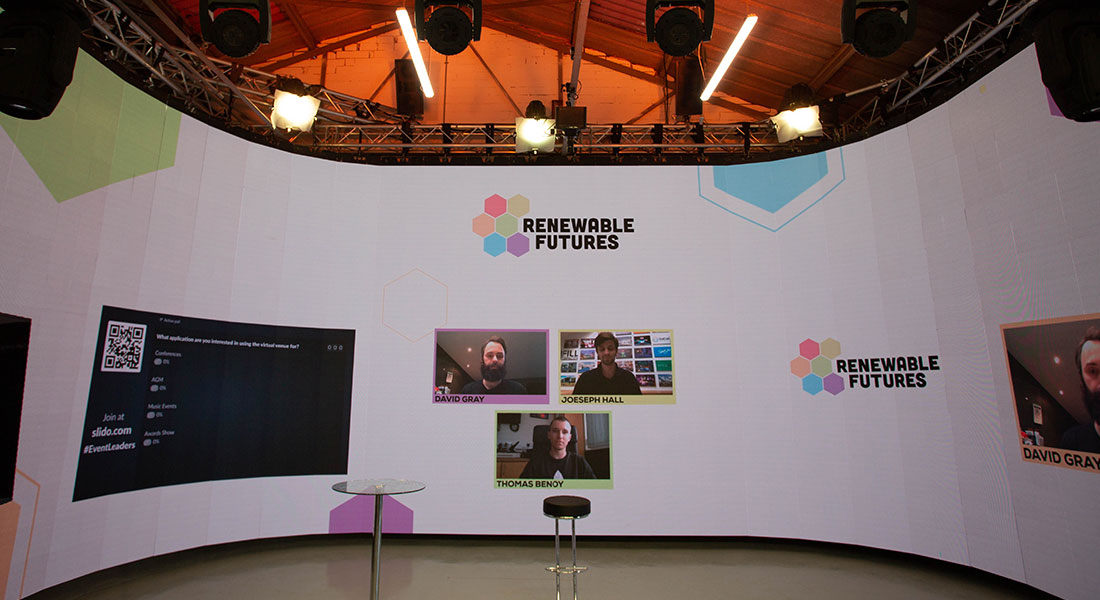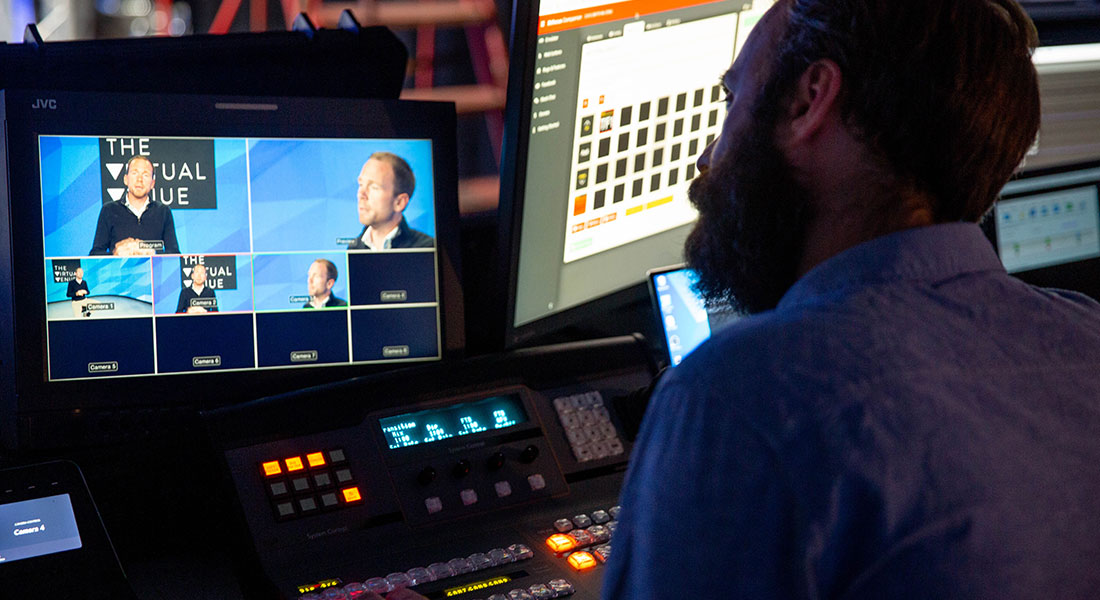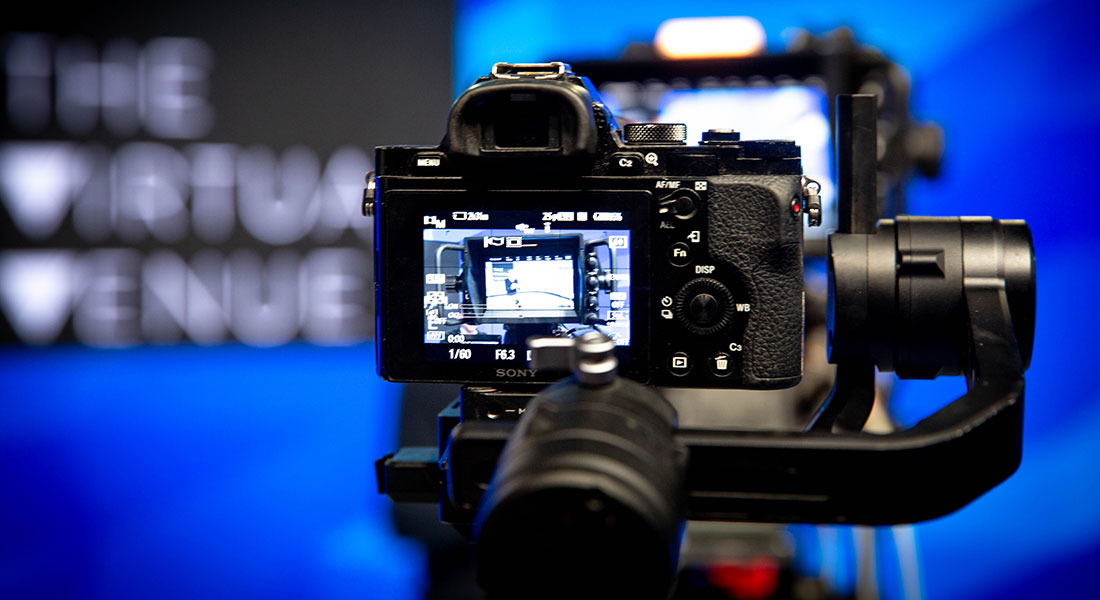W ith toilet roll flying off the shelves like it's going out of fashion, face coverings becoming an everyday item, and live events grounding to a screeching halt, 2020 has been a year where many of us have had to think quickly and transfer our skills into a new sector, which is exactly what Johnny Palmer and the team at Pytch did with The Virtual Venue.
When the pandemic first hit the events industry, you quickly pivoted your skills and expertise to ensure you continued to meet customer needs during a very testing time. Where did the idea of the Virtual Venue come from?
It was clear to me from the offset that the events industry was going to be very hard hit; hit fast and for the longest and it was obvious that a lot of companies might not survive this. Looking at how it would play out, I saw a complete drop in revenue and I saw event organisers wanting to deliver their messages and create experiences in ways where people don’t have to come together. I also considered the possibility that there might be a second wave or lockdown could continue indefinitely.
So the next step in that process was to consider what transferable skills we have that allow us as an organisation to find a new way of bringing in income, helping our customers deliver their messages and experiences and also keeping our staff in a job. It was very obvious to me that technical skills including producing shows and delivering content would transfer well to a TV studio type concept. So within a few weeks of lockdown, we hit it hard and built the Virtual Venue. The Virtual Venue is now one of the most comprehensive virtual events spaces in the UK.

Due to the majority of corporate events, gigs & festivals, and trade shows being cancelled this year, many events have now gone virtual as a means of continuing entertainment and communication with clients and consumers. Do you see virtual events continuing at the rate they are even when restrictions start to ease further for the entertainment industry?
A lot of the events that we do are about information delivery and some are also about creating human connections. Focussing on information delivery first, the objective is to inform people and traditionally, a way of doing that would be a 3-day conference. Personally, I’ve always felt that’s a dysfunctional model. It’s financially inefficient, it’s very heavy in the toll it takes on the planet, it’s also not very conducive with a happy home life and it’s also highly disruptive for people’s work.
I’ve never really believed in the efficacy of the way we fly people all over the world to go to live events, so for me, the virtual or hybrid model is something that’s been coming for years anyway and this has just accelerated the whole process. So now we’re in a place where we can engage with events in multiple ways. They can potentially either come into the venue and engage with it first hand in a live experience, they can also engage remotely in a live way with commenting, polling and networking, and they can also engage after the event by absorbing the content in a pre-recorded and published kind of way.
In terms of other events like theatre, gigs and festivals, I think virtual has its place in the future. Live events are bringing people together; they’re travelling, walking, sitting down, they’re in an enclosed space or they’re outdoors. There are a lot of people out there who don’t have this as an option to them; whether it’s for financial reasons, physical, social, or mental health reasons. Traditionally live events can be exclusive for these people, whereas now, we have an opportunity to make our events become much more inclusive because we can deliver that experience through multiple different formats.
Once again, I feel that this has been coming for a long time now and COVID’s accelerated that. So to answer your question, I absolutely, categorically believe that they are here to stay and every pitch my company does in future will have significant consideration for how we’re going to engage with an audience who isn’t in the venue. Furthermore, the psyche is now wired that there’s a chance there might be a pandemic and a time where people can’t come to events, or the government might shut down events. So we need to think as a company from day one how we’re going to engage with huge audiences without having the physical event.
I understand you transformed one of your warehouses into the Virtual Venue. Talk to us about the process of this and the kit and people that are available to use.
Fortunately for us at Pytch, I own the industrial estate that we’re built on. That’s 6 warehouses - Pytch currently occupies two and one was available. So I used one of my existing properties and completely gutted and refurbished it. We did up the office space, toilets, power, tech - everything and we fitted it out as a dedicated, almost purpose-built, studio for the Virtual Venue.
In terms of equipment in that space, we use the very best of live events technology: a curved video wall, broadcast camera gear, a mixture of intelligent LED and tungsten lighting, vision mixers, media servers, vision control, gigabit internet connections - a lot of high-end tech from live events was put into this space. We’ve also incorporated extensive catering and hospitality services so that when people come they have a really positive all-round experience. We’re trying to replicate the experience of a 5-star hotel or a first-class flight when you come to the Virtual Venue.

How do you track the kit that you’re using at the Virtual Venue and how do you know what’s available for each client?
Stock control is critical for us as our business is very asset focussed. We need to know where things are, how long they’re there for, how the assets are performing individually. It’s vital data for us to run our company properly. So, that applies to the Virtual Venue. Within Current, we’ve made a job called ‘The Virtual Venue’ which is an open-ended rental, meaning it has no end date. All the equipment down to the last cable, LED screen and camera lens is listed in the Virtual Venue job and that job is indefinite, so when we’re speccing other jobs, we can see if there’s a shortage and see whether that kit is in the Virtual Venue or not.
There will hopefully be times in 2021 when we’re doing live events again and we need some of that equipment. In those cases, we’ll remove those items from the Virtual Venue opportunity and allocate them to the live opportunity and then back again to make sure we’re accurately stock controlling where everything is.

I know that a big passion of yours is to bring forward even more eco-friendly methods of working into the entertainment industry. How does the Virtual Venue reflect that?
When you look at the amazing work by people like Chris Thompson from Shambala Festival, he identified that most of the carbon emissions at live events are not from us but from the people coming to the events. Travel is one of the worst offenders from an environmental POV. The Virtual Venue allows us to make it so that audience members don’t need to travel - they can stay at home or in the office. Not only that, but it means we can expand our audience infinitely to many more people who aren’t able to travel and wouldn’t normally be able to attend these events. Not only are we producing fewer carbon emissions, but we’ve also got an infinitely larger audience.
In addition to that, we’re not transporting our equipment as it stays in situ, so again, fewer carbon emissions. Also, the space we’re working in is very environmentally friendly and low energy. We’ve insulated the roof of the Virtual Venue to a very high standard. We’re using air source heat pumps and most of the energy at Pytch HQ is from our 50 kW solar PV array. Lighting wise, we aim to use as much LED as we can, however, we are admittedly using tungsten lighting at the moment as well.
The Future
As we see more and more businesses moving their events online in 2020, the virtual world is becoming ever more prominent.
A huge thanks to Johnny for sharing his journey in creating the Virtual Venue and giving us all a deeper insight into his forecast for the world of live events.